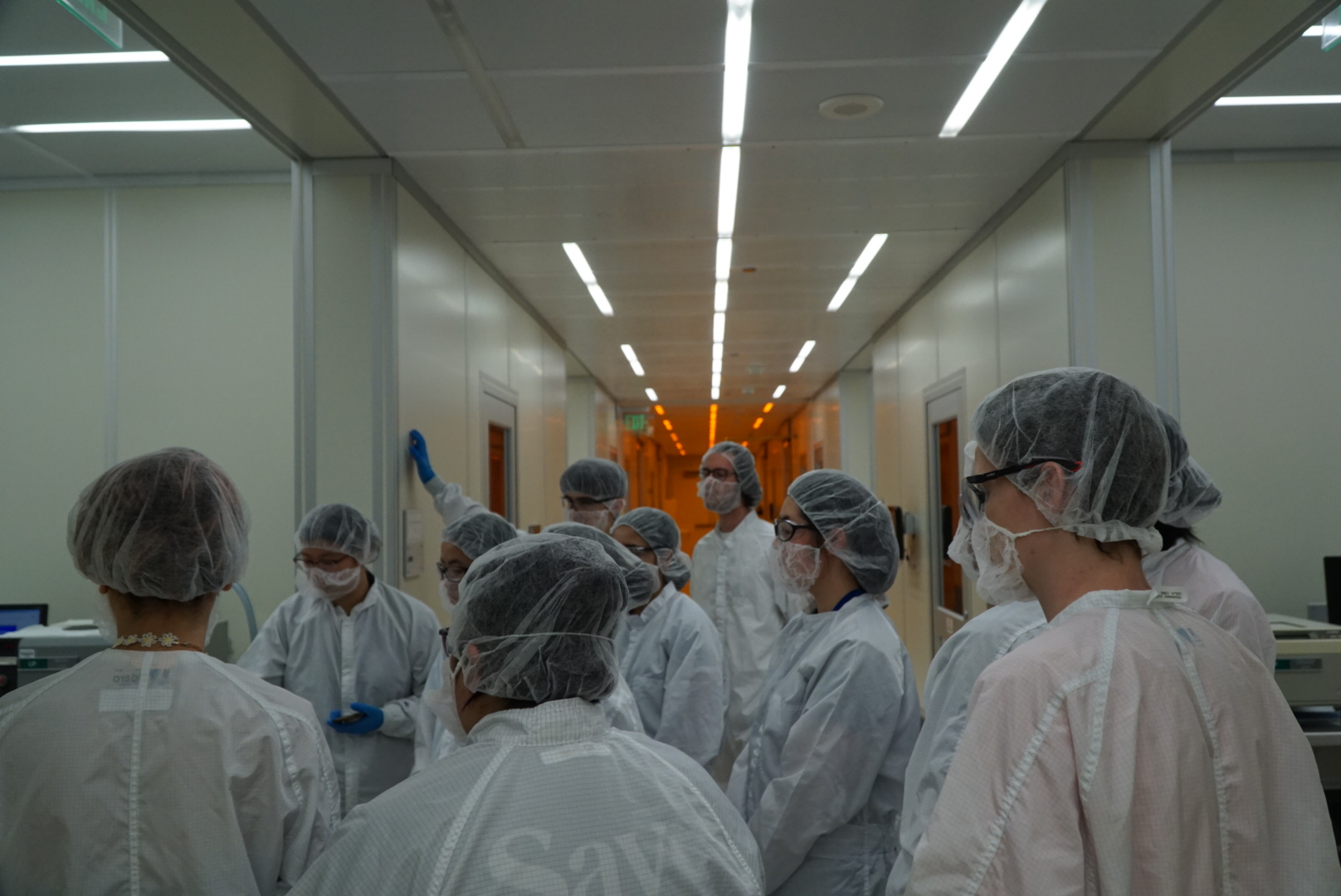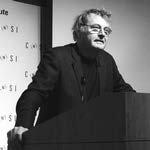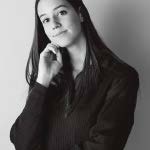Combine the scientific method and artistic processes to imagine the impossible.

Make connections between scientific research, popular culture, and contemporary arts
In the highly competitive Sci|Art Studio + Lab, students are immersed in science and art practices to simultaneously develop and sharpen analytical and creative skills. This program prepares students for interdisciplinary thinking before they begin their undergraduate education.
During this intensive two-week program, students make connections between cutting-edge scientific research, popular culture, and contemporary arts. Through historical retrospectives, surveys of current art-science collaborations, and science fiction movie screenings, students are exposed to the interface of science, art, and culture with a focus on multidisciplinary collaborations.
Sci|Art Lab + Studio Summer Institute Program
The Sci|Art Lab+Studio Summer Institute exposes high school students to the scientific method and artistic processes as complementary tools for rethinking traditional models of exploration and innovation by making connections between scientific research, popular culture, and contemporary arts.
The program will include lab visits, workshops facilitating hands-on experiments, and lectures with world-renowned artists and scientists. Through engagement, students will be exposed to the work of scientists and artists that explore new forms of creative expression, communication, and collaboration within this multi-disciplinary field.
To foster academic development, students will develop an original concept for a collaborative final project under the challenge of ‘Imagine the Impossible’. Building off of course material and guided by the assistance and skill of the base Sci|Art Team, student groups will create and deliver a multimedia presentation to share their work and ideas during the program’s closing ceremony.
Application deadline: June 6, 2025 (Session A); June 13, 2025 (Session B & C) | Enrollment deadline: June 13, 2025 (Session A); July 4, 2025 (Session B); July 18, 2025 (Session C)
Applications are reviewed and admission to the program is granted on a rolling basis starting February 15th. Applying at your earliest convenience, prior to June 6th, is highly recommended.
The program has application requirements for admission. Eligible applicants who successfully submit all requirements will be reviewed and notified via email of an admission decision within 3 weeks.
Applicants are required to provide the following during the online registration process:
- An unofficial transcript from grade 9 to present reflecting a cumulative GPA of 3.2 or higher
- If your school transcript utilizes a different grading system, please submit your transcript as is. If available, please attach a translation/equivalency guide.
- INTERNATIONAL STUDENTS: If you are an international student, a transcript refers to your complete secondary academic record. To learn more about converting your grades into a US-based GPA, please click here.
- If your school has a translation/equivalency guide, please also include it with your transcript. If you do not have a translation/equivalency guide, please still submit your most up-to-date transcript as is for staff to review.
- Value statement: At the time of registration, ALL applicants will be prompted to submit a few short sentences reflecting on their pursuit of participation in a UCLA Precollege Summer Institute. Please note that students are strongly discouraged from relying on ChatGpt/AI tools for their application responses and are encouraged to submit original and authentic answers.
- A 500-word essay from one of the following prompts:
- Choose a favorite sci-fi movie or book and tell us what ideas you find exciting within it.
- If you plan to pursue the sciences as a major in college, tell us about your art or music interests.
- If you plan to pursue the arts as a major in college, tell us about your interest in science and technology.
- Optional letter of recommendation from a teacher or counselor. Letters of recommendation can be submitted via email to artscicenter@gmail.com after online registration is complete.
Due to the intense nature of the Sci|Art Lab + Studio Summer Institute and the time commitment involved, a residential track is available as well as a commuter track.
The residential track is ONLY available to students who will be 17 years of age or older by June 23, 2025. NO EXECPTIONS are made to this eligibility requirement.
The Sci|Art Lab + Studio Summer Institute – Session A is a residential program.
All residential precollege program tracks also feature scheduled non-curricular evening and weekend activities that all residential students are expected to participate in. The nature of these scheduled activities is at the sole discretion of the individual academic department offering the program, and are not operated by UCLA Summer Sessions. To learn more about when your selected program will host such activities, please consult the schedules for each program, or contact the department in question directly: ivanadama@g.ucla.edu
Most of our residential precollege programs will hold check-in on the Sunday before the start of the program between 4-6pm, and hold check-out the Saturday after the final day of class at 11am. Please contact the department in question directly to confirm check-in and check-out times: ivanadama@g.ucla.edu
For more information on UCLA housing precollege programs, please see the Housing for Minors page.
The Sci|Art Lab + Studio Summer Institute – Session B & C is a commuter program.
There is NO on-campus housing available for the Sci|Art Lab + Studio Summer Institute through the institute program or UCLA Summer Sessions. Additionally, please note that only students aged 17 and older as of June 23rd, 2025 are eligible to sign a housing contract, and not all program dates correspond to when contracts are available. Students interested in exploring this option should review information at UCLA Summer Housing.
Participants of the Sci|Art Lab + Studio Summer Institute must commute to the UCLA campus each day of the program. Specific location information (e.g. classroom) will be provided to enrolled students closer to the start of the program.
Parking
Summer Sessions parking permits will be available on a first-come, first-served basis. Students have the option to purchase a summer term permit or a daily permit.
Please review the Transportation and Parking Services web page and read the “Summer Quarter Parking (All Students)” section for more information on all permit types, including cost.
Coursework
DESMA 6; 4 units
Grading Basis
Students will be graded on a Pass/No Pass basis upon completion. See University Credit, Grades and Transcripts for more information about academic credit.
In order to successfully complete the program, students must not have more than 1 excused or unexcused absence.
UCLA Summer Sessions Summer Scholars Support
Qualified students attending grades 9th – 11th in Spring 2025 in the state of California may be eligible for Summer Scholars Support, a need- and merit-based scholarship offered by the UCLA Summer Sessions Office. Students must be 15 years old by the first day of Summer Sessions 2025 on June 23rd in order to participate in a Precollege Summer Institute and/or apply for Summer Scholars Support. A limited number of full and partial scholarships are available to support enrollment in SCIP/eSCIP, one Summer Course, or a Precollege Summer Institute.
Summer 2025 deadline to apply: March 15.
Session A: Residential
June 22 – July 5, 2025
Session B: Commuter
July 7 – July 18, 2025
Session C: Commuter
July 21 – August 1, 2025
Program Eligibility: 9th-12th grade in Spring 2025*
Application deadline:
- June 6, 2025 (Session A)
- June 13, 2025 (Session B & C)
Enrollment deadline:
- Session A: June 13, 2025
- Session B: July 4, 2025
- Session C: July 18, 2025
*All participants must be at least 15 years of age (or 17 for residential sessions) by the first day of Summer Sessions 2025 on June 23rd, no exceptions allowed.
The schedule and syllabus are subject to change. Enrolled students will be given updated materials closer to the program start date.
Fees and Payment Info
The program fee includes the unit fees for the UCLA coursework offered as part of the program and thus varies by UC student status. In addition to the program fee, students are assessed other campus and administrative fees during the summer. This is a summary of fees that commonly apply to the selected student type.
Actual tuition and fees are subject to change by the University of California. Visit the fees, payment, and financial aid section for important disclaimer, as well as more details on fees, payment instructions, and information on delinquency, refunds, and financial aid.
RESIDENTIAL PROGRAM FEES:
The program fees listed in the selection are for the commuter versions only (Sessions B and C). The program fee also includes the cost of UCLA Housing. The following are the program fees for the Residential version.
- High School Student = $3793
- Incoming UCLA Student = $3369
- Incoming UC Student = $3369
All other fees listed will remain the same for the Residential version.
Meet your instructors
Victoria Vesna
Founder & DirectorVictoria Vesna, Ph.D., is a media artist and Professor at the UCLA Department of Design | Media Arts and Director of the Art|Sci center at the School of the Arts and California Nanosystems Institute (CNSI). She is currently a senior researcher at IMéRA – Institut Méditerranéen de Recherches Avancées in Marseille (2011-2013). Her work can be defined as experimental creative research that resides between disciplines and technologies. With her installations she explores how communication technologies affect collective behavior and how perceptions of identity shift in relation to scientific innovation. Victoria has exhibited her work in over twenty solo exhibitions, more than seventy group shows, has been published in excess of twenty papers and gave 100+ invited talks in the last decade. She is the North American editor of AI & Society and in 2007 published an edited volume – Database Aesthetics: Art in the Age of Information Overflow, Minnesota Press and most recently an edited volume entitled Context Providers: Conditions of Meaning in Media Arts. (co-edited with Christiane Paul and Margot Lovejoy). Intellect Press, 2011.

Jim Gimzewski
Scientific DirectorJim Gimzewski is a Distinguished Professor of Chemistry at the University of California, Los Angeles; Director of the Nano & Pico Characterization Core Facility of the California NanoSystems Institute; Scientific Director of the Art|Sci Center and Principal Investigator and Satellites Co-Director of the WPI Center for Materials NanoArchitectonics (MANA) in Japan. Prior to joining the UCLA faculty, he was a group leader at IBM Zurich Research Laboratory, where he research in nanoscale science and technology for more than 18 years. Dr. Gimzewski pioneered research on mechanical and electrical contacts with single atoms and molecules using scanning tunneling microscopy (STM) and was one of the first persons to image molecules with STM.
His accomplishments include the first STM-based fabrication of molecular suprastructures at room temperature using mechanical forces to push molecules across surfaces, the discovery of single molecule rotors and the development of new micromechanical sensors based on nanotechnology, which explore ultimate limits of sensitivity and measurement. This approach was recently used to convert biochemical recognition into Nanomechanics. His current interests are in the nanomechanics of cells and bacteria where he collaborates with the UCLA Medical and Dental Schools. He is involved in projects that range from the operation of X-rays, ions and nuclear fusion using pyroelectric crystals, direct deposition of carbon nanotubes and single molecule DNA profiling. Dr. Gimzewski is also involved in numerous art-science collaborative projects that have been exhibited in museums throughout the world.

Ivana Dama
Assistant DirectorIvana Dama is a sound artist and researcher currently attending the Graduate Program in School of Art at Yale University. She graduated from UCLA’s School of Arts and Architecture in the Design Media Arts and Digital Humanities department. Her art practice includes audio-video installations, robotics, web projects, as well as music performances. Her work explores the themes of sound and space ranging from microscopic, architectural, and satellite scale.

Sci|Art Lab + Studio Summer Institute FAQ
The Sci|Art Lab+Studio Summer Institute focuses on interdisciplinary collaborations, exploring the possibilities and implications of scientific and technological innovation through the application of creative methodologies. In this program, we consider how merging science and art cultures can expand the communication of knowledge, enrich approaches to science and technology, as well as foster and build community across disciplines. The advantage of adding an artistic approach to scientific thinking lies in arts ability to address challenges from a wider and more creative thought-process, inspiring alternative ways for dealing with and applying complexities.
Through historical retrospective, cutting-edge lab visits, guest lectures, field trips, surveys of current art-science collaborations, science fiction movie screenings, and a final project consisting of both science and art research, students are exposed and immersed in the interface of science, art, and culture.
Although helpful, students don’t need specific background or have taken classes in either art or science previously. We encourage students to have the curiosity and willingness to embrace scientific method and artistic process as complimentary tools for rethinking traditional models of exploration as well as innovation that makes connections between cutting edge scientific research, popular culture, and contemporary arts.
Yes, for the final project, students will work collaboratively in small groups under the challenge: “Imagine the Impossible”. Students will focus on one aspect of the course work that they are interested in and work in small groups to expand upon and research their chosen topic. They are asked to develop ideas or methodologies for the application of this information, whether that be in an art project, product proposal, or media design. Instructors work closely with the students on the conceptual and technical development of their ideas. The final works are delivered in a multimedia presentation during our closing ceremony.
Still have questions? Check out the general Summer Institutes FAQ.

